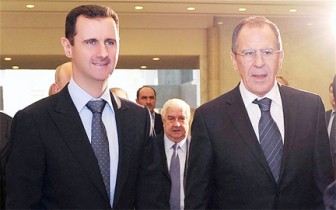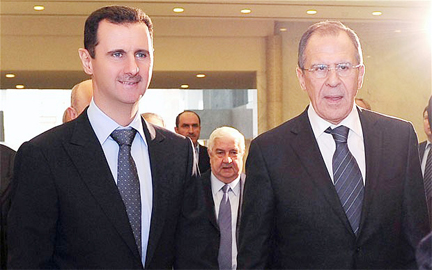AMMAN, (Reuters) – Russia won a promise from Syrian President Bashar al-Assad yesterday to bring an end to bloodshed in Syria, but Western and Arab states acted to isolate Assad further after activists and rebels said his forces killed over 100 in the city of Homs.

Foreign Minister Sergei Lavrov, representing a rare ally on a trip to the Syrian capital that other states are shunning, said both countries wanted revive a monitoring effort by the Arab League, whose plan to resolve Syria’s crisis Moscow and Beijing vetoed in the U.N. Security Council.
There was no indication from Lavrov’s comments that the issue of Assad eventually giving up power – a central element of the Arab proposal that failed in the Council – had been raised.
Assad said he would cooperate with any plan that stabilised Syria, but made clear that only included an earlier Arab League proposal that called for dialogue, release of prisoners and withdrawing the army from protest centres.
Walid al-Bunni, a senior member of the opposition Syrian National Council, said Lavrov brought no new initiative and that “so-called reforms” promised by Assad were not enough. “The crimes that have been committed have left no room for Bashar al-Assad to remain ruler of Syria,” he told Reuters.
Russia’s mediation also failed to slow a rush by countries that denounced the Russian-Chinese veto three days ago to corner Syria diplomatically and cripple Assad with sanctions in hopes of toppling him.
Opposition activists said government forces renewed shelling of the central city of Homs yesterday just before Lavrov’s arrival, killing some 19 people in an onslaught that they say has claimed over 300 lives in the last five days.
There were also reports from residents of shelling and fighting yesterday between government and rebel forces in Hama, another urban stronghold of anti-Assad sentiment.
Syria says Homs – the heart of 11 months of protest against Assad’s rule – is the site of a running battle with “terrorists” directed and funded from abroad. Parts of the city are held by insurgents that include army defectors.
Syria’s references to foreign interference are widely read to include Gulf Arab states, which followed the lead of Washington and European Union countries yesterday in reducing their diplomatic presence in Damascus.
“The president of Syria assured us he was ‘completely committed to the task of stopping violence, regardless of where it may come from’,” Lavrov said after his meeting with Assad, accompanied by Russia’s top spy.
Lavrov – whose government wields unique leverage as a major arms supplier with long-standing political ties to Damascus, and maintains a naval facility on its coast – told Assad peace was in Russia’s interests.
Lavrov also affirmed Russia’s “readiness to help foster the swiftest exit from the crisis on the basis of positions set out in the Arab League initiative”.
Russia has supported an Arab League peace proposal for Syria floated last November envisaging a withdrawal of troops from cities and towns, the release of prisoners, and reforms.
Assad endorsed that plan, with no reference to a later version that formed the basis of the failed U.N. resolution. It called on Assad to empower a deputy to negotiate with his opponents as a step toward elections and political transition.
“Syria from the beginning has welcomed any efforts that back the Syrian solution to the crisis,” the state news agency quoted Assad as saying.
“It has been committed to the Arab League plan approved last November, and cooperated fully with the mission of monitors, despite the obstruction of some Arab parties in their work.”

